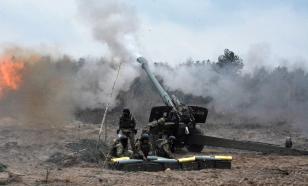Moldova commits economic suicide for Brussels
During the last CIS summit in Minsk, an unpleasant incident occurred. The journalists, who could hardly hear what the presidents of Moldova and Russia were talking about, assumed that, at some point, the presidents were going to have a verbal fight with each other. The presidents were talking about the Association of Moldova with the EU and the introduction of Russia's sanctions in response.

The unpleasant incident with the verbal fight, which Moldovan President Timofti started at the summit in Minsk, was not incidental.
On the one hand, after the signing of the Association Agreement with the European Union, the Moldovan authorities found themselves involved in an open and violent confrontation with Russia, primarily political confrontation. Moldova's position has already triggered extreme tensions in the relations between Moldova and the Russian Federation, including the trade embargo, the development of some sort of "responsive measures" in Chisinau and attempts to limit the broadcast of Russian TV channels in Moldova. Meanwhile, the EU and the United States actively push Moldova towards more serious confrontation, promising new loans and hinting at admission to NATO.
On the other hand, diplomatic talents of representatives of the Moldovan leadership are approximately of the same level with Ukrainian officials, particularly ex-Foreign Minister of Ukraine Andriy Deshchitsa, who publicly insulted the Russian president.
In Moldova, people view their President Nicolae Timofti as an illegitimate puppet, who voices the position of the ruling coalition. The president of Moldova was elected by the "pro-European" coalition in violation of the Constitution of the Republic of Moldova, as a result of the protracted parliamentary crisis, when the country was living without any head of state nearly for four years. Traditionally, Timofti reads out the text that someone wrote for him. He prefers not to say anything himself. Moldova has not seen a more useless and worthless character in history - and this is the softest definition that one can find in Moldovan media.
The incident in Minsk had been arranged in advance. The absolutely incompetent figure from Chisinau was sent for the summit with a task to show aggressive pressure on Putin and threaten him with Moldova's pullout from the CIS. As usual, Timofti took a piece of paper from his pocket and read the text out loud - a set of accusations against Russia. He did not expect to be attacked in return.
In fact, the Moldovan President formulated the position of Brussels, repeating the accusations that we have heard many times from Ukrainian diplomats. These include Russia's attempts to undermine the European aspiration towards integration, imperial ambitions and intentions to deliberately unleash a trade war.
As for the "European integration," over the past couple of months, several high-ranking officials have stated that Moldova's membership in the European Union was out of the question in the foreseeable future.
Interestingly, none of government officials of Moldova can answer the question why the official Chisinau did not even try to consult Russia before signing the free trade agreement in the framework of association with the EU. After all, the Moldovan economy depends on Russia almost entirely.
Why was the association agreement signed so hastily, without any parliamentary hearings, without discussing anything with the Moldovan society? Why did the Moldovan authorities suppress all attempts of opposition political forces to hold a referendum on the country's foreign policy to choose between the Customs Union and the EU?
Did Moldovan officials seriously believe that Russia would not respond to the virtual abolition of more than 200 trade and economic treaties and agreements between Moldova and Russia that have been introduced over the last twenty years? In 2001, Moldovan Communist President Vladimir Voronin and Russian President Vladimir Putin signed a Framework Agreement on Strategic Partnership between the two countries. Does the "pro-European" ruling coalition of Moldova intend to bury this partnership?
It is absurd to say that the unilateral refusal of one of the partners from the full range of economic agreements "will have no impact on the Russian economy," as Chisinau officials said speaking of "imperial ambitions."
Paradoxically, it was in the course of the Minsk summit, when Moldova received another chance to normalize relations with the Russian Federation. In response to the scandal, started by the Moldovan President, Vladimir Putin set forth a new initiative to postpone the effect of Moldova's Association Agreement with the EU, at least until 2016, to start talks to overcome all the problems. This is the format that shows light at the end of the tunnel for the Ukrainian economy. Kiev has already elicited a similar pushback for its association agreement with the EU.
However, after the Minsk summit, Chisinau showed no reaction to Putin's proposal. No discussions about the possible postponement were conducted. On the contrary, Europe actively encouraged to expedite the ratification of the agreement.
Meanwhile, the events of the recent months show a vivid picture of the economic suicide committed by the Moldova authorities. The harvest of vegetables and fruits remains on the fields. The owner of a small agricultural farm in Moldova said: "I was selling onions to Russia for four leus per kilogram. Now I have 1,000 tons of onions that I can not sell for more than 1.5 leus, while the prime cost of it is two leus. How can I pay my bills with that? They promised compensations, but we have not seen anything. I do not think that the farm will survive this year."
One can imagine what large farms experience. Many of them were exporting all their products to Russia. Given Russia's embargo, this is a disaster for them, taking into consideration the fact that the agricultural sector of Moldova accounts for 40 percent of GDP. Moldova was exporting nearly 80 percent of its agricultural products to Russia.
Undoubtedly, the pro-Western regime in Moldova will not even think to take advantage of Putin's suggestions. The nature of Chisinau's actions shows that in Moldova, nothing depends on the Moldovan authorities. It is the EU and the United States that rigidly define the external course of the republic.
Alexander Isayev
Pravda.Ru
Subscribe to Pravda.Ru Telegram channel, Facebook, RSS!


